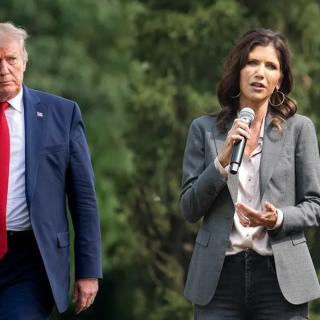Jobs or the environment? That's the tragic dilemma in which the powers that be seek to trap the global working class forever, convincing us that we cannot have both. We desperately need to find a way out of this dilemma . . . before the capitalist system, with its relentless drive to make more and more profit at any cost, makes this planet unlivable for the human species.
The Right knows how to politically exploit this dilemma: pretend to prioritize jobs over the environment -- until the products become unprofitable and the workers become disposable. That will fool some of the people in swing states all of the time, or so hopes the Party of Lincoln in the age of Donald Trump. Unlike the GOP, the Democratic Party, torn between its capitalist donors and working-class base, wishes to present itself not only as the defender of both jobs and the environment, but also as good for both workers and capitalists, an impossible balancing act that frequently fails.
Hillary Clinton's 2016 gaffe in Ohio, to take one example, was the very image of "the liberal elite out of touch with common people" -- an invaluable political gift to the Right: "I'm the only candidate who has a policy about how to bring economic opportunity using clean renewable energy as the key into coal country. Because we're going to put a lot of coal miners and coal companies out of business, right, Tim [Ryan, D-Ohio]?" Clinton later protested that her remark was taken out of context (which is true) and pleaded that she actually had "a comprehensive $30 billion planto help revitalize and diversify the [coal-producing] region's economy." The coal country was unmoved: West Virginia in 2016 voted for Bernie Sanders in the Democratic primaryand Trump in the presidential election.
There is no denying that even corporate Democrats would be the lesser of two evils if the choice had to be made only between the two right wings of the property party. There is also no denying, though, that the lesser evil's less-than-comprehensive plan does not measure up to the vast scale of unmet human needs and urgent environmental problems. Economist Robert Pollin estimates that, just to reduce CO2 emissions so as to tackle climate change, at least "between 1.5 and 2 percent per year of GDP" in every country must be invested in energy efficiency and cleaner renewable energy sources. The aforementioned $30 billion over ten yearsfor coal communities, a promise of $60 billion over ten yearsin clean energy grants, etc. that the Clintonites were willing to offer would be several orders of magnitude too small.
But "we can't afford," some pro-capitalist pundits would inevitably pipe up, what it would really cost to begin a just transition to a new ecological system of production, consumption and distribution that could allow us to live well while also cleaning up the planet Earth, our only home. If we have learned anything from the Great Financial Crisis of 2007-2008 and its aftermath, however, that is that there is virtually no limit to the amount of money that the central banks of the United States, the European Union and Japan would "print" to bail out the globally connected financial systems at risk of collapse: "Add up guarantees and lending limits, and the Fed had committed $7.77 trillionas of March 2009 to rescuing the financial system, more than half the value of everything produced in the U.S. that year," Bloombergestimated in 2011.
So, financing is no obstacle. "If the environment were a bank, it would have been saved by now," read many a witty post-crisis protest sign. What's our excuse for not fighting for what we really want: a just transition to an ecological economy, which leaves no worker or country behind? The late labor leader and visionary environmentalist Tony Mazzocchiargued for "a program that provides working people with job and income guarantees," what he called a "Superfund for Workers," to solve the "jobs versus environment dilemma." An idea whose time has come?
September 8, 2018, "Rise for Climate, Jobs, and Justice," is a day of mass actions all over the world to "promote clean energy economy." In Columbus, Ohio, at the City Hall, from 11 am to 2 pm, an action will be held under the banner of "OUT with the Fossils, WIN with Renewables!" Will the environmentalists who rise up on that day be able to put "job and income guarantees" on the political agendas of their countries? Can we in Columbus? (To get involved, contact the Community Organizing Center, walk@igc.orgor 614-252-9255.)



